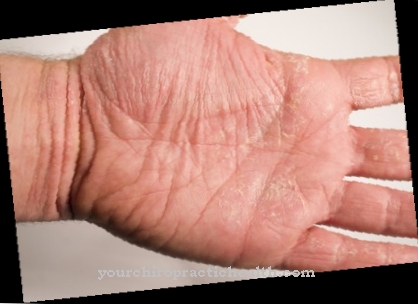As swelling will usually be a edema denotes in which there is an accumulation of water in the tissue. Mostly are Swelling or. Edema caused by diseases and should therefore be examined quickly by the doctor.
What is edema?

Swelling or edema develops when water or fluid is formed and stored outside the cells. The water mostly collects in the interior of the body and in the tissue that has escaped from the body vessels.
Swelling can occur practically anywhere on the body. Typical edema or swellings are water retention in the legs, which then feel thick and heavy. A swelling can also be recognized by the fact that a clearly visible dent remains when it is pressed.
Edema or swelling can occur in accidents, e.g. may have encountered. Metabolic disorders and numerous diseases and hormonal changes can also be the cause of swelling. Not infrequently, however, there is also a serious illness such as cirrhosis of the liver or heart failure.
causes
As already noted, the causes of swelling or edema can be of various types. The most common causes are mostly caused by minor and major accidents. It comes e.g. in the case of a headbutt to the well-known bump on the head, in which water or liquid is stored in the surrounding skin by injured tissue, where a swelling is then clearly visible.
Other causes can be: liver diseases such as cirrhosis, hormonal changes such as hypothyroidism, hyperthyroidism, pregnancy and menopause, as well as heart diseases such as heart failure.
In addition, circulatory disorders and medication are also possible causes of swelling and edema. In rare cases, swellings also occur with inflammation and infections, as well as with a lack of protein.
Further illnesses that can appear as causes can be found below.
You can find your medication here
➔ Medicines against swellingDiseases with this symptom
- Heart failure
- Cirrhosis of the liver
- gout
- Quincke's edema
- Renal failure
- Sports injuries
- thrombosis
- Menopause
- Bartholinitis
- Insect venom allergy
- Lymphedema
- sprain
- Hypothyroidism
- mumps
- Hyperthyroidism
- Sore rose
- Circulatory disorders
- Chronic venous insufficiency
Diagnosis & course
If edema is suspected, the doctor will first ask questions about previous illnesses. It is of interest whether the swellings z. B. occur more intensely in the evening or drugs are taken that could contribute to cirrhosis of the liver or heart failure.
As part of a physical examination, the doctor will check whether there are any varicose veins that may have caused the swelling. The blood and urine are checked for abnormal protein and electrolyte levels.
In addition, ultrasound and x-ray examinations (also with contrast media for vein examination) as well as computed tomography, magnetic resonance imaging and other blood and heart examinations can provide information about edema diseases. If the cause is eliminated, acute edema regresses completely, while chronic edema is associated with permanent tissue changes.
Complications
Swellings are mostly harmless and usually resolve on their own. Complications can arise if parts of the airways swell as a result of a food allergy or infection. Allergy-related swelling after an insect bite can also be a medical emergency.
Water retention in the abdomen and circulatory disorders as a result of swelling in the limbs can also lead to complications. Swellings that occur as a result of an operation on the wisdom teeth make it difficult to eat and often cause pain. In hives, the swollen areas of the face can become difficult to deform and cause life-threatening shortness of breath in the mouth and throat.
Swelling after thrombosis surgery can cause permanent damage to the skin and leg veins and, in rare cases, embolism. Serious complications can also occur if the swelling persists longer than usual, is accompanied by symptoms such as fever or difficulty breathing, or is the result of a medical emergency. The possible complications depend largely on the underlying cause and the time of treatment. Your general practitioner can provide a final overview of the possible complications of swelling.
When should you go to the doctor?
Swelling can have many causes, forms and severity. It is generally a good idea to have a doctor examine a swelling because it is usually an immune reaction of the body and it should be clarified to what extent this is problematic. Whether a doctor is actually consulted ultimately depends on whether the person affected can recognize the swelling as harmless or whether it is not sure whether it will heal healthily.
If, for example, a small swelling occurs after an insect bite or the skin swells around a cut, this reaction is as expected and the swelling will go away on its own without complications. Swelling with an unknown cause, on the other hand, must be examined by the doctor. This applies, for example, to swelling in joints that often occurs during exercise, but also to unusual manifestations such as sudden, severe swelling after a bite.
An urgent case for a doctor is throbbing, worsening, reddened or very painful swellings, as well as cases that have not subsided within a few days. A swelling must not be burdened on the way to the doctor; For example, if the patient can no longer walk without pain due to a swelling in his leg, he or she must be driven to the doctor. Otherwise stress could cause worse damage.
Doctors & therapists in your area
Treatment & Therapy
If swelling occurs, a doctor should be consulted, as it can usually be due to an illness. Should the swelling or the edema rather harmless, e.g. If there is a bump on the head from bumping, a visit to the doctor will not do any harm.
As with any medical examination, the personal conversation between doctor and patient is the first priority in the diagnosis. The doctor wants to find out under what conditions and in what intensity the swelling occurs and since when the symptoms have been present. Furthermore, the doctor will want to determine whether there are previous illnesses and which drugs are already being taken. The truthful answers to these questions can often provide the correct cause for the swelling.
Following the conversation, an examination is carried out on the patient's body. The doctor checks the legs, veins and varicose veins in particular to see whether there are any abnormalities. Likewise, urine and blood values are mostly measured, for which the electrolytes and protein values are of particular importance. If there is then a suspicion of an illness, a further examination with the help of computed tomography (CT), ultrasound examinations, x-rays, venography (examination of the veins with contrast medium), lymphography (x-ray diagnosis of the lymphatic system) may be necessary.
Depending on the final cause, the individual treatment must then be initiated by the doctor. Since underlying diseases are usually the cause of swelling, these should be treated first. With heart failure through appropriate medication. Furthermore, health-oriented exercise therapy should always accompany the treatment. Above all, this includes sport and exercise, which stimulates blood flow in the veins and legs and pumps the water retention out of the tissue.
Compresses (e.g. compression stockings or compression bandages) also help, in which the pressure exerted should reduce the swelling. Elevating the swollen legs also helps to reduce the swelling of the edema.
Furthermore, depending on the cause, pneumatic compression, lymphatic drainage or stroking massage can also be used. Medicines can also be useful. All these measures serve the purpose of draining water quickly from the body or tissue and reducing or dissolving the swelling.
Outlook & forecast
The outlook and prognosis always depend on the cause of swelling. Acute swelling from injury or inflammation usually resolves within a few days, while joint or bone swelling can take weeks or more to recover. In rheumatic diseases, swelling can also develop into chronic complaints.
The prospect of a rapid decrease in swelling is given if the underlying disease is recognized early and treated comprehensively and there are no unforeseen complications in the course of recovery. If the cause is eliminated quickly, acute edema usually regresses completely, while chronic swelling can be associated with permanent tissue changes.
In children, the elderly and people with immunodeficiency, swelling can also lead to mild fever symptoms, depending on the size and location of the edema.
A severe course is to be expected with swelling of the organs. Swelling of the kidneys or liver can lead to organ failure and death, while swelling of the brain can also cause permanent damage. Due to the diversity and severity of the possible swellings, a final prognosis can only be made by a doctor.
You can find your medication here
➔ Medicines against swellingHome remedies & herbs for swelling & edema
- Herbal remedies with red vine leaves are helpful for swelling caused by weak veins. Red vine leaves stabilize the blood vessels and stimulate blood circulation.
You can do that yourself
In most cases, swelling can be fought relatively well with cold. A cold bath, a packet of ice cubes or a cooling pad can help. In order not to burn the skin, very cold things should always be wrapped in a cloth first and then placed on the skin. The affected area on the skin should not be strained or touched excessively. If the swelling is painful, pain medication can also be used for a short period of time. However, these should not be used over a longer period of time, as they can otherwise damage the stomach.
Herbal teas can also help with swelling. Here the patient can usually choose a tea of his choice. Creams and gels that cool and soothe the skin can also be used. These should especially be used before going to bed, if another cooling system is not possible. A compress with quark is also suitable.
To prevent swelling in the first place, the skin should be cooled immediately after an accident or after an operation. This applies especially to swelling of the face that occurs after operations on the jaw or in the oral cavity.






.jpg)




















